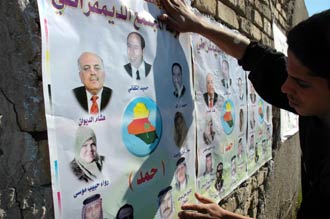
A man puts up an election poster in Baghdad's Sadr City
Jan. 26, 2005. The Iraqi elections will be held on Jan. 30.The past few days
have witnessed the leaving of many Iraqi families to neighboring countries for
fear of attacks that armed groups might launch to derail Sunday's
elections.(Xinhua photo)
The past few days have witnessed the leaving of many Iraqi families to
neighboring countries for fear of attacks that armed groups might launch to
derail Sunday's elections.
Most of those who left the country are of the upper or
middle classes and
who have relatives in the neighboring countries, especially in Syria, Jordan and
the Gulf Arab countries, according to some travel agencies in
Baghdad.
They said that many families booked tickets to the neighboring
countries to evade the possible violence and attacks during the elections, and
the demand has increased remarkably in the past two days.
The wealthy
Iraqi families are taking advantage of the midyear holidays to travel abroad so
as to avoid the danger and enjoy a few days of rest with the children, said the
owner of one of the agencies Rawad Hassan, 26, said the family of his friend
Sahal had left Iraq a week before the scheduled elections because their house is
close to one of the schools.
"They feared that it could become a voting
center and thus become a target for attacks," Rawad said.
He explained
that Sahal's family preferred staying in Iraq but the deteriorating security
condition forced them to leave.
"The family is rich and could afford the
expenses. They would not return within a month," Rawad added.
Iraqis are
due to vote on Jan. 30 to choose 275 members of a national assembly, whose key
task will be to debate and approve a new constitution.
But there are many
reasons to make the Iraqi families, especially the wealthy ones to leave the
war-torn country.
Besides the power cut, shortage of fuel and the cut of
drinking water, Abu Musaab Al Zarqawi, an ally of al-Qaida and the most wanted
man in Iraq, announced a few days ago in a video tape posted on the internet
that he is launching war against the Iraq elections.
During the past two days, 10 voting centers in the governorate of Salah Al
Deen were attacked by mortar rounds, and three others in the south were under
similar attacks.
The interim Iraqi government has taken some security
precautions to safeguard the security of the voters and announced holidays
starting from Jan. 29 to Jan. 31, in addition to banning traveling between Iraqi
governorates.
A new curfew would be imposed from 7 p.m. (1600 GMT) until
6 a.m. (0300 GMT) starting on Friday evening until Tuesday in several places in
the country, and Baghdad international airport would be closed for Jan. 29 and
Jan. 30.
Despite all the precautions, the Iraqi government conceded that
it would be impossible to prevent all possible actions against the
elections.
Interim Iraqi Prime Minister Iyad Allawi said any security
plan could not be ideal and would always have loopholes.
Among the
fleeing Iraqi families, some trips unfortunately ended in tragedy.
Abu
Sinan, 68, said the family of his neighbor left Iraq on the first day of Eid El
Adha for Syria to avoid possible attacks during the elections.
But they
had an accident on the road and three members of the family died, he
said.
As for those families which choose to stay, some have started to
prepare for the election day as if they were preparing for a war, storing plenty
of food, fuel and water, observers said.



